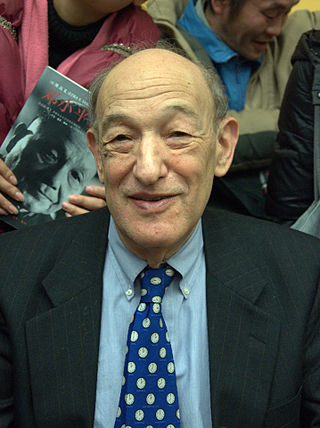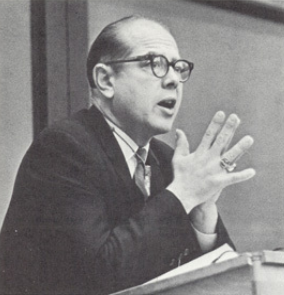
Ezra Feivel Vogel was an American sociologist who wrote prolifically on modern Japan, China, and Korea. He was Henry Ford II Professor of the Social Sciences at Harvard University.
Tu Weiming is a Chinese-born American philosopher. He is Chair Professor of Humanities and Founding Director of the Institute for Advanced Humanistic Studies at Peking University. He is also Professor Emeritus and Senior Fellow of Asia Center at Harvard University.

Theda Skocpol is an American sociologist and political scientist, who is currently the Victor S. Thomas Professor of Government and Sociology at Harvard University. She is best known as an advocate of the historical-institutional and comparative approaches, as well as her "state autonomy theory". She has written widely for both popular and academic audiences. She has been President of the American Political Science Association and the Social Science History Association.
Kenneth Guy Lieberthal is an American professor and politician known as an expert on China's elite politics, political economy, domestic and foreign policy decision making, and on the evolution of US-China relations.

Carl W. Ernst is the William R. Kenan, Jr., Distinguished Professor Emeritus of Islamic studies at the Department of Religious Studies at the University of North Carolina at Chapel Hill. He was also the founding director (2003-2022) of the UNC Center for Islamic and Middle East Studies.
Lucian W. Pye was an American political scientist, sinologist and comparative politics expert considered one of the leading China scholars in the United States. Educated at Carleton College and Yale University, Pye chose to focus on the characteristics of specific cultures in forming theories of political development of modernization of Third World nations, rather than seeking universal and overarching theories like most political scientists. As a result, he became regarded as one of the foremost contemporary practitioners and proponents of the concept of political culture and political psychology. Pye was a teacher at the Massachusetts Institute of Technology for 35 years and served on several Asia-related research and policy organizations. He wrote or edited books and served as advisor to Democratic presidential candidates, including John F. Kennedy. Pye died of pneumonia at age 86.

Rudolf G. Wagner was a German sinologist. He was Senior Professor at the Department of Chinese Studies at the Heidelberg University and Co-Director of the Cluster of Excellence "Asia and Europe in a Global Context: Shifting Asymmetries in Cultural Flows".

The University of Hawaiʻi Press is a university press that is part of the University of Hawaiʻi.
Elizabeth J. Perry, FBA is an American scholar of Chinese politics and history at Harvard University, where she is the Henry Rosovsky Professor of Government and Director of the Harvard-Yenching Institute. She is a fellow of the American Academy of Arts and Sciences, a corresponding fellow of the British Academy, a recipient of a Guggenheim Fellowship, and served as Director of Harvard's Fairbank Center for East Asian Research from 1999 to 2003 and as president of the Association for Asian Studies in 2007.
The Weatherhead East Asian Institute (WEAI) at Columbia University is a community of scholars affiliated with Columbia's schools, bringing together over 50 full-time faculty, a diverse group of visiting scholars and professionals, and students from the United States and abroad. Its mission is to train new generations of experts on East Asian topics in the humanities, social sciences, and the professions and to enhance understanding of East Asia in the wider community. Since its establishment in 1949 as the East Asian Institute, the WEAI has been the center for modern and contemporary East Asia research, studies, and publication at Columbia, covering China, Japan, Taiwan, Hong Kong, Korea, Mongolia, Tibet, and, increasingly, the countries of Southeast Asia.
Susan J. Pharr is an academic in the field of political science, a Japanologist, and Edwin O. Reischauer Professor of Japanese Politics, director of Reischauer Institute of Japanese Studies and the Program on U.S.-Japan Relations at Harvard University. Her current research focuses on the changing nature of relations between citizens and states in Asia, and on the forces that shape civil society over time.
Peter van der Veer is a Dutch academic who is the Director at the Max Planck Institute for the Study of Religious and Ethnic Diversity in Göttingen in Germany. He has taught anthropology at the Free University of Amsterdam, Utrecht University and the University of Pennsylvania. Van der Veer works on religion and nationalism in Asia and Europe.

Robert Anthony Scalapino was an American political scientist particularly involved in East Asian studies. He was one of the founders and first chairman of the National Committee on United States – China Relations. Together with his co-author Chong-Sik Lee, he won the 1974 Woodrow Wilson Foundation Award for the best book on government, politics, or international affairs as awarded by the American Political Science Association. Scalapino's daughters include the artist Diane Sophia and poet Leslie Scalapino (1944–2010).

The Fairbank Center for Chinese Studies at Harvard University is a post-graduate research center promoting the study of modern and contemporary China from a social science perspective. The center hosts and organizes academic activities, provides research funds for faculty and students, and helps policy-makers and news media to understand modern China. The center sponsors the Edwin O. Reischauer Lectures.
Martina Deuchler is a Swiss academic and author. She was a professor of Korean studies at the SOAS University of London from 1991 to 2001.

Barbara Mittler is a German sinologist. She is co-director of the Cluster of Excellence "Asia and Europe in a Global Context".

Sebastian Heilmann is a German political scientist and sinologist. He serves as the founding president of the Mercator Institute for China Studies (MERICS) in Berlin. Heilmann is a professor for the political economy of China at the University of Trier with many publications on China's political system, economic policy and international relations.

Jerrold D. Green is the president and chief executive officer of the Pacific Council on International Policy in Los Angeles, California. He is concurrently a research professor at the University of Southern California Annenberg School for Communication and Journalism.

Sergei Lousianin is a Russian political scientist, orientalist, an expert on international relations in East Asia, domestic and foreign policy of China and Mongolia, security issues in the Asia-Pacific Region and Central Asia.
Mary C. Brinton is an American sociologist. She is the Director of the Edwin O. Reischauer Institute of Japanese Studies at Harvard University.










